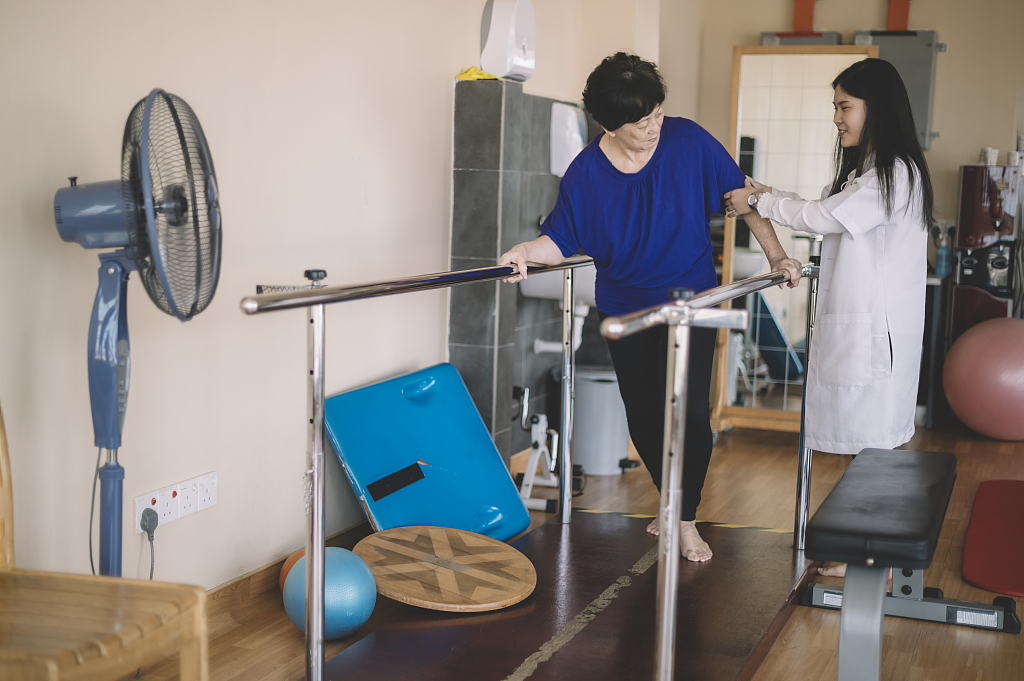
As the degree of population aging deepens, "virtual nursing homes" – a new model of home care that makes full use of social resources – are becoming the choice of more and more elderly people in China.
The Chinese National Development and Reform Commission and 22 other departments jointly issued the "Implementation Opinions on Promoting Capacity Expansion and Quality Improvement of Consumption and Accelerating the Formation of a Strong Domestic Market" on March 13, 2020, proposing to vigorously develop the "internet + social services" consumption model and support the development of community-based virtual nursing homes.
Over the past 10 years, virtual nursing homes have been promoted in many places in the country, exhibiting expanding service groups, diversified service content, and prominent intelligent features. The elderly want to live at home. However, while their children are willing to take care of them, they suffer from lack of time and energy. Virtual nursing homes seem to be providing a solution to the problem.
'Internet +' smart elderly care services embedded in virtual nursing homes
With just one phone call, the nursing home can provide various services for the elderly at home, from buying vegetables and cooking to cleaning, from massage services to accompanying the sick, so that the elderly can enjoy "personal customized elderly care" without leaving home. In the virtual nursing home in Chengguan District, Lanzhou City, Gansu Province, there is not a single bed, but it can serve tens of thousands of elderly people.

An "information and home care service" platform and an "intelligent elderly care informatization" management platform have been created to incorporate registered elderly people, regardless of their location, according to Qin Tiantian, director of the virtual nursing home in Chengguan District. The system can provide professional and standardized home care services in a timely and accurate manner through big data collection.
"Although virtual nursing homes are virtual, the services are actually in place," said Qin. "As of now, more than 133,700 elderly people have been registered and hospitalized, and the total number of services has reached 13.79 million."
"The combination of internet technology and elderly care services can not only update offline service maps, day care center monitoring and other content in real time, but also retrieve long-term monitoring data such as blood glucose and blood pressure of the elderly," said Liu Mingzhe, a technical engineer at the virtual nursing home in Chengguan District, adding that smart devices such as infrared sensors and voice-activated alarms can also realize "cloud monitoring" for the elderly in their virtual nursing homes.
"Different from traditional nursing homes, virtual nursing homes are an old-age care service platform built on information technology," said Pan Helin, professor at the Digital Economy Research Institute of Zhongnan University of Economics and Law, further pointing out that virtual nursing homes are generally led by the government and integrate nursing institutions and communities.

"Elderly care resources such as medical service centers and housekeeping services provide various professional services for the elderly through remote diagnosis and treatment and home-based services," he added.
Still in the exploratory development stage
The emergence of virtual nursing homes is a result of adapting to the country's social needs – a high degree of population aging and a stage of rapid development. According to data released by the National Bureau of Statistics, by the end of 2018, China's population of elderly people over 60 years old reached 249 million, accounting for 17.9 percent of the total population, and the pension situation is relatively severe.
"The comparative advantages of developing virtual nursing homes are very obvious. It can realize the centralized, precise and efficient supply of decentralized nursing resources, which is an effective choice for my country to deal with the impact of population aging," Pan said.
Virtual nursing homes are not unexpected. As early as 2007, China's first virtual nursing home care service center was born in Gusu District, Suzhou City, Jiangsu Province. It mainly provides home-based care services for the elderly, especially empty nesters and the destitute. Today, after more than 10 years of development, Suzhou has formed a mature virtual pension model, which has been replicated and promoted throughout Jiangsu.

In recent years, some places are also exploring different forms of virtual nursing homes. For example, Shanghai has vigorously developed an "embedded" elderly care system, creating a "15-minute home elderly care service circle" in urban areas, and launched new types of community elderly care institutions.
"Virtual nursing homes are all new things in the international arena, lacking mature experience reference, and relying more on our own exploration," Pan said.
"Current virtual nursing homes are also facing excessive reliance on government purchases, insufficient market activity, and shortage of talents. The bottleneck is that the construction of virtual nursing homes has a long way to go from one to many and from many to excellent," he added.
Pan believes that it is necessary to improve relevant laws and regulations, standardize the development of the industry, strengthen the supervision of this new business format, and at the same time, under the principle of inclusiveness and prudence, enhance the tolerance of related enterprises and promote the development of the industry.
Some other experts also mentioned that the key difference between virtual nursing homes and general housekeeping services lies in their professionalism and orientation. It is recommended to speed up the training of compound talents with skills in geriatrics, rehabilitation, nursing, psychology, and management, and expand the career development space of senior care service professionals.